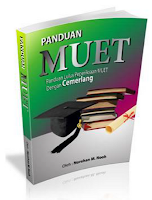<b><b>MUET Exam</b></b> Tips to Score Band 6 ... - Blog <b> - Blog <b>Muet</b> - Blog Muet |
| <b><b>MUET Exam</b></b> Tips to Score Band 6 ... - Blog <b> - Blog <b>Muet</b> Posted: 16 May 2014 09:36 PM PDT Ranking: 5 Students  Written by Suzanne Ong
The first thing you need to know about English is that it's not a memorizing subject, rather it's more of a skill that you acquire through lots of practice. It's like learning Math or taking up a new instrument, you cannot be good at it right away; you need to practice before getting it right, unless if you're naturally gifted which I think most of us aren't. 1. MUET Writing
See, even if you understand a bombastic word and fairly know how to use it, it still doesn't equate into having a good grasp of English if your grammar is all over the place. Grammar always comes first and once you've mastered that, then you could go ahead and memorize all those fancy schmancy words to make yourself look smarter. Simple grammar rules like tenses and when to put an S after a word and when not to, all those require practice. I suggest you pick up an exercise workbook on grammar and practice on it, but don't stop there. You will also need to start reading more English materials, any English materials really, as long as they're grammatically correct. The main thing is to read how the article is written as opposed to what it is written. The more you take notice on how they write, you'll slowly get used to the grammar being used. You cannot just read without writing though, because like I said, English is a skill and you need to practice. Therefore, you should always write and have someone with better English to have a look at it and tell you where you went wrong. Only then you could really improve on your Writing. It takes time, so be patient. 2. MUET Speaking If you don't usually speak English with your friends, pick out one friend that is good at English and ask him to speak the language with you. It would be awkward at first for the both of you, but if you're determined and if your friend is really willing to help, you will get through the awkwardness and after a while you could really see the improvement. My friend did that and at first she couldn't really speak a proper sentence, but she wasn't embarrassed to ask and learn even if she might've embarrassed herself through the process. She worked hard and after a few months, she really did improve compared to the first time she started speaking English. 3. MUET Reading For the first ever Reading paper I did, I think I got less than half correct because I was looking at the questions the wrong way. After learning my mistake, I've improved to getting more than half correct almost every time. Of course you need to read more to familiarize yourself with the type of formal writing (from my experience, they mostly give data questions so most of them are written formally) as it is different from informal or narrative writing, which I find easier to understand. 4. MUET Listening The audio can be a jerk sometimes (which happened to me during my actual exams) so you really have to train yourself to listen carefully. They play the audio twice so what I normally do is to write down the answer with a pencil first, sometimes I even write down 2 or 3 answers when I'm not sure, then when they play it the second time, I write it down with my pen. Another thing I think you should know about MUET is that the questions sometimes test your general knowledge. Not like what is currently happening in the news, more like stuff about One Malaysia, One Sport, the education blueprint, things like that. So getting a high band sometimes depends on luck too. I guess that's about it. Remember it takes a lot of time, patience and hard work to get it right. People who speak English at home have an advantage because they read, watch and listen to English stuff all the time, so if you're not one of them then you'll have to put in extra work compared to them. Even after your MUET exams are over, don't stop improving your English, it would give you a better chance of getting a job in the future. Oh and if you're interested in reading about my MUET experience, you can check out my blog. There's stuff about my form 6 life there too if you are interested in reading :) Alright, all the best! Written by Suzanne Ong, an aspiring writer who had just finished STPM and is in the midst of pursuing her dream of becoming an author. She blogs about random daily things that people don't voice out at http://xsuzannex.wordpress.com and writes fiction at http://www.wattpad.com/user/raind33r. |
| You are subscribed to email updates from muet past year paper - Google Blog Search To stop receiving these emails, you may unsubscribe now. | Email delivery powered by Google |
| Google Inc., 20 West Kinzie, Chicago IL USA 60610 | |








